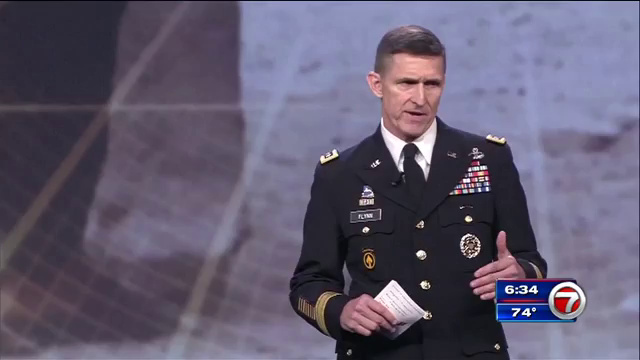WASHINGTON (AP) — President-elect Donald Trump’s national security adviser and Russia’s ambassador to the U.S. have been in frequent contact in recent weeks, including on the day the Obama administration hit Moscow with sanctions in retaliation for election-related hacking, a senior official said Friday.
Trump spokesman Sean Spicer acknowledged contacts between Michael Flynn and Ambassador Sergey Kislyak, but said a phone conversation occurred on Dec. 28, one day before the sanctions were levied. Spicer said the men did not discuss sanctions. He did not specifically deny additional contacts the following day.
It’s not unusual for incoming administrations to have discussions with foreign governments before taking office. But the repeated contacts just as President Barack Obama imposed sanctions would raise questions about whether Trump’s team discussed — or even helped shape — Russia’s response to the penalties.
Russian President Vladimir Putin unexpectedly did not retaliate against the U.S. for the move, a decision Trump quickly praised.
More broadly, Flynn’s contact with the Russian ambassador suggests the incoming administration has already begun to lay the groundwork for its promised, new closer relationship with Moscow. That effort appears to be moving ahead, even as many in Washington, including Republicans, have expressed outrage over intelligence officials’ assessment that Putin launched a hacking operation aimed at meddling in the U.S. election to benefit Trump.
During a news conference Wednesday, Trump pointedly would not say whether he planned to repeal the sanctions ordered by Obama. He again highlighted his warmer rapport with the Russian leader.
“If Putin likes Donald Trump, I consider that an asset, not a liability, because we have a horrible relationship with Russia,” he said.
The sanctions targeted the GRU and FSB, leading Russian intelligence agencies that the U.S. said were involved in the hacking of the Democratic National Committee and other groups. The U.S. also kicked out 35 Russian diplomats who it said were actually intelligence operatives.
Trump has been willing to insert himself into major foreign policy issues during the transition, at times contradicting the current administration and diplomatic protocol. He accepted a call from Taiwan’s president, ignoring the longstanding “One China” policy that does not recognize the island’s sovereignty. He also publicly urged the U.S. to veto a United Nations Security Council resolution condemning Israeli settlements, then slammed the Obama administration for abstaining and allowing the measure to pass.
Questions about Trump’s friendly posture toward Russia have deepened since the election, as he has dismissed U.S. intelligence agencies’ assertions about Russia’s role in the hacking of Democratic groups. In briefing Trump on their findings, intelligence officials also presented the president-elect with unsubstantiated claims that Russia had amassed compromising personal and financial allegations about him, according to a separate U.S. official.
Trump acknowledged for the first time this week that he accepts that Russia was behind the hacking. But he questioned whether officials were leaking information about their meetings with him, warning that would be a “tremendous blot” on their record.
Flynn’s own ties with Russia have worried some Republicans who are more skeptical of the Kremlin than Trump appears to be. After leaving his position as director of the Defense Intelligence Agency in 2014, Flynn made appearances on RT, a state-run Russian television network. In 2015, he was paid to attend an RT gala in Moscow, where he sat next to Putin.
As national security adviser, Flynn will work in the West Wing close to the Oval Office and have frequent access to Trump. Unlike Trump’s nominees to lead the Pentagon, State Department and other national security agencies, Flynn’s post does not require Senate confirmation.
Flynn’s contacts with the Russian ambassador were first reported by Washington Post columnist David Ignatius. The U.S. official who spoke to The Associated Press was not authorized to confirm the contacts publicly and insisted on anonymity.
Spicer, the Trump spokesman, initially said there was one phone call between Flynn and Kislyak on Dec. 28, as well as a Christmas greeting via text messages over the holidays. He said sanctions were not part of the discussions.
“The call centered around the logistics of setting up a call with the president of Russia and the president-elect after he was sworn in, and they exchanged logistical information on how to initiate and schedule that call,” Spicer told reporters Friday. “That was it, plain and simple.”
A transition official later cited a second phone call that occurred earlier in December. That official said Kislyak reached out to Flynn for the second phone call on Dec. 28, and by the time Flynn called him back, it may have been Dec. 29 in Moscow.
Trump spoke with Putin about a week after his victory. The transition team has not disclosed any other contact between the leaders.
It’s unclear how U.S. officials became aware of the contacts between Flynn and Kislyak, who has served as Russia’s envoy to the U.S. since 2008. U.S. monitoring of Russian officials’ communication within the United States is known to be common.
Flynn has spoken with other foreign officials since Trump won the November election, as have incoming White House senior advisers Steve Bannon and Jared Kushner, Trump’s son-in-law. State Department spokesman Mark Toner said he saw nothing inappropriate in Trump’s transition team contacting Russian or any other foreign officials.
AP writers Jonathan Lemire in New York and Bradley Klapper in Washington contributed to this report.
Copyright 2024 The Associated Press. All rights reserved. This material may not be published, broadcast, rewritten or redistributed.

